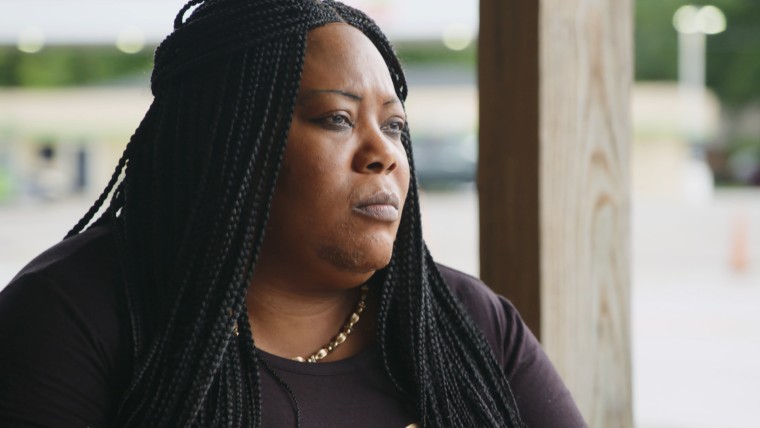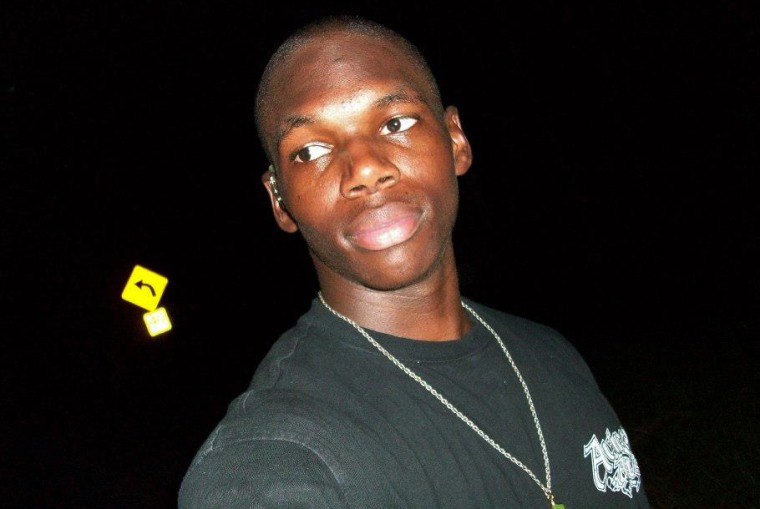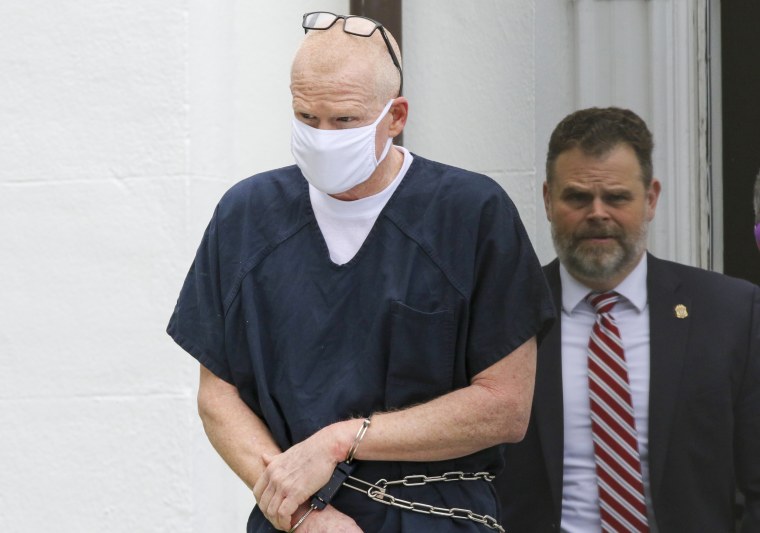BAMBERG, S.C. — Pamela Pinckney was in the hospital, bruised and in pain from several broken bones, when a lawyer named Alex Murdaugh offered his help.
More than a decade ago, long before Murdaugh, a personal injury attorney who has since been disbarred, would capture national attention, Pinckney was in a car wreck with her teenage son, who became paralyzed from the neck down and died two years later. But Murdaugh, she would find out, allegedly defrauded them — not once, but twice — in a case that illustrates the harm he is accused of inflicting on vulnerable clients well outside his family’s powerful orbit.
“He painted a pretty picture in front of my presence. But behind my back, it was otherwise,” Pinckney said. “I was just in disbelief. Up until this day, it’s like it just doesn’t seem real to me, what really took place and what happened.”
Read more on this story at NBCNews.com and watch Dateline tonight at 9 p.m. ET/8 p.m. CT.

In another once-unfathomable turn, Murdaugh, 54, is set to face trial in January in connection with the slayings of his wife, Margaret, and son Paul.
It would take their unsolved killings in June 2021 to unlock a sensational chain of events and expose a web of connections that led prosecutors to file more than 80 financial-related charges against Murdaugh, alleging he stole about $8.5 million from more than a dozen victims, including the Pinckneys, over many years.
Pinckney estimates Murdaugh and his alleged co-conspirators pocketed $1 million owed to her family. She has made peace with the ordeal, she said, but she still believes Murdaugh has to answer for his alleged crimes.
“I want every penny of what I’m going through right now: my pain, my suffering, my anxiety, my depression,” Pinckney said. “I want what’s due to me.”
The crash
On Aug. 22, 2009, Pinckney was driving on Interstate 95 in South Carolina’s coastal Lowcountry, headed to a Family Dollar for milk, when her SUV swerved uncontrollably. It flipped over multiple times, leaving her with two broken ankles and broken bones in her knee, thigh, shoulder and neck.
Her passengers were also hurt: Daughter Shaquarah suffered scratches, while niece Natasha Thomas had a facial injury.
Her 19-year-old son, Hakeem, “got thrown out on his head, so he had a spinal cord injury,” Pinckney said. “They operated on him. He ended up paralyzed, a quadriplegic.”

He was placed on a ventilator at a nursing home in North Augusta, about 90 miles northwest of the family’s home in the Lowcountry. His physical state was a far cry from the student-athlete he had been at the South Carolina School for the Deaf and Blind, where he was a linebacker on the football team. Hakeem was diagnosed with profound hearing loss at age 3.
After the crash, he could still communicate with other people by reading lips, through sign language or by using a dry erase board. Pamela Pinckney remained hospitalized as she endured several operations.
She believed the wreck was the result of a malfunctioning tire. When the family decided to pursue legal representation, they were referred to one of the region’s longest-standing law firms — Peters, Murdaugh, Parker, Eltzroth & Detrick — founded in 1910 by Randolph Murdaugh Sr., Murdaugh’s great-grandfather and the area’s first elected top prosecutor.
Murdaugh visited Pinckney at her bedside to learn what happened. He gave her hope that she had a tenable lawsuit.
“He seemed to be a real nice guy. Very respectful. Very well-mannered,” Pinckney recalled.
She added: “I trusted him wholeheartedly.”
The settlements
The Pinckneys filed the first lawsuit in April 2010 against the tire manufacturer and the local business that sold them their tires. The tread separated from a left rear tire, according to the complaint, causing the car to veer “out of control” and overturn.
The family sought unspecified damages for claims of negligence and reckless conduct. Pinckney said she preferred a swift resolution so she could use the money to transfer Hakeem out of the nursing facility and to a handicap-accessible home with a ventilator.
“Mr. Alex Murdaugh told me and my entire Pinckney family that he has our best interests, we don’t have anything to worry about and we’re like family to him,” Pinckney said. “And whatever he needs, he’s going to be there for us to support us.”
Pinckney said her son needed a conservator because she was unable to take care of him during her own grueling recovery. Murdaugh suggested a local banking executive, Russell Laffitte, who was tasked with managing Hakeem’s financial affairs beginning in 2010.
On Oct. 7, 2011, Murdaugh settled the negligence case out of court for an undisclosed amount.
Meanwhile, around that time, Pinckney was contending with a separate crisis involving Hakeem: She learned from the nursing home that he was in a coma and had been rushed to the hospital. He had suffered back-to-back seizures and was clinically brain dead, she was told, and he had to be removed from the ventilator. He died on Oct. 11, four days after the suit was settled.
He was 21.

Three years later, Pinckney again sought help from Murdaugh’s law firm when she decided to file a wrongful death suit against Hakeem’s nursing home in a bid to get answers about how he fell into a coma under its care.
Pinckney, who was pleased with how Murdaugh handled the first suit, said the second time appeared no different, with another settlement signed in 2016 for an amount that was not publicly disclosed.
“It was just something to soothe me for the moment,” Pinckney said of the second settlement. “But the money doesn’t matter to me. My child would mean more to me than anything in this world.”
The indictments
Pinckney did not realize anything was amiss in how her lawsuits were handled until Murdaugh’s law firm contacted her in October 2021. By then, the mysterious shooting deaths of Margaret, 52, and Paul, 22, at their hunting lodge had grabbed headlines, and the case expanded into a twisting saga when Murdaugh was charged in connection with an alleged shooting on a roadside in which he told authorities he tried to have himself killed so another son, Buster, could collect on his life insurance policy.
Murdaugh’s law firm said in a statement at the time that he had resigned after the partners discovered company funds were missing, which led South Carolina authorities to announce they were reviewing accusations that Murdaugh had “misappropriated” money from the firm.

Pinckney said the firm, which changed its name this year to exclude “Murdaugh,” flagged her case files in its internal investigation. She and her current lawyer, Justin Bamberg, believe the amount that was stolen is roughly $1 million.
In an 11-count indictment filed in April, the state attorney general’s office accuses Murdaugh, Laffitte and a third alleged co-conspirator, Cory Fleming, another lawyer who represented Pamela Pinckney in the tire lawsuit, of breach of trust with fraudulent intent, computer crimes and criminal conspiracy.
The indictment alleges Murdaugh, Laffitte and Fleming worked together to steal some of the settlement money owed to the Pinckneys, including $309,581 that was used in part to pay a Murdaugh family member and to pay off other conservatorship accounts that Murdaugh “previously borrowed money from.” Fleming also is accused of failing to disperse $130,192 to Pinckney and using part of it to pay a debt owed to a private plane company for a charter flight for him, Murdaugh and another lawyer to go to the 2012 College World Series in Omaha, Nebraska. Separately, the indictment says, Fleming transferred money to a supposed “case expense for Pamela Pinckney” account in which the money was converted for Murdaugh’s personal use.
While it remains unclear how all of the money in the alleged financial schemes involving the Pinckneys and other clients was used, Murdaugh’s lawyers told a judge last year that he is a 20-year opioid addict. Prosecutors also say he laundered money through a drug ring.
Laffitte, whose trial is set for Tuesday in a federal court in Charleston, has pleaded not guilty; his lawyer, Bart Daniel, would not comment further.
Fleming has also pleaded not guilty. His lawyer, Deborah Barbier, said in a previous statement that he is “yet another casualty of the host of crimes perpetrated by Alex Murdaugh.”
Murdaugh remains jailed in lieu of $7 million bond. The financial charges have taken a back seat to his murder trial, which is scheduled for Jan. 23. He has not entered a plea to the financial crimes charges, and he has pleaded not guilty to the murder charges.
His lawyers declined to comment about the indictment involving the Pinckneys. They have also repeatedly denied Murdaugh was involved in the murders of his wife and son, saying in a previous statement that “he loved them more than anything in the world.”
Bamberg said the Pinckney family is emblematic of many of the clients Murdaugh allegedly swindled: poorer and working-class people seeking injury relief. But Hakeem’s case, he added, is especially heart-wrenching, because “they realized here is this deaf quadriplegic young man” and “after he died, they stole this money.”
For Pinckney, Murdaugh’s fate must be decided in a court where the once-powerful lawyer is held accountable — and treated no differently because of his station in life.
Pinckney wants “justice to be served,” she said. “I want the justice system to be equal.”
Craig Melvin, Haylee Barber and Carol Gable reported from Bamberg, and Erik Ortiz from New York.
Source: | This article originally belongs to Nbcnews.com









